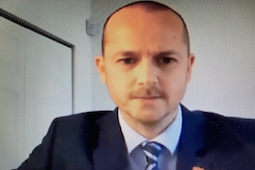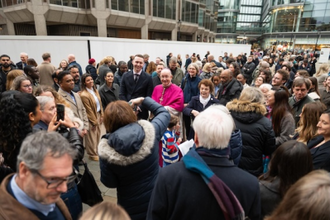Scotland: Catholics face 'alarming levels of intolerance'

Anthony Horan
Source: SCMO
Giving evidence to the Equalities and Human Rights Committee of the Scottish Parliament today (15 June 2017) Anthony Horan, Director of the Catholic Parliamentary Office claimed: “a culture of fear prevents people from being open about their faith.”
Mr Horan who was giving evidence to MSP’s on the topic of bullying and harassment in schools, with an emphasis on anti-religious prejudice. The Committee heard evidence from a number of people, including representatives of the Church of Scotland, Muslim Community, Jewish Community, and the Scottish Secular Society.
In his comments to MSP’s, Mr Horan said: “My overriding concern about this subject is the culture of fear that runs right through society and which makes people feel, at best uncomfortable, and at worst totally frightened to be open about their faith. In my written submission to the Committee I provided testimonies of a number of young people who had experienced anti-Catholic prejudice in their school, most of it relating to the Church's teaching on abortion and marriage. One student even dropped a subject to "avoid the harassment."
Mr Horan added: “There is an alarming level of intolerance being levelled at some young people simply because they are Catholic or because they hold a particular view that others may disagree with. This is not a culture of tolerance and respect. We have to be very mindful of the need to tackle anti-religious behaviour and be wary of creating a hierarchy of rights in relation to the protected characteristics listed in the Equality Act 2010. We cannot allow some to trump others. It must be all or nothing.”
“There is also the sad reality of an increase in religious hate crime in Scotland, with a recently published report revealing that religiously aggravated crime is at an all time high. Within that, a deeply worrying and disturbing 57% of charges are as a result of anti-Catholic behaviour. Compare this to the percentage of charges relating to Protestantism (27%) and Islam (17%) and we are left with an undoubted sectarian problem that needs to be addressed.”
Mr Horan concluded: “If we are to build a culture of tolerance and respect for our young people we need to take on board the hard facts which reveal to us the reality of hate crime in our country and allow people across all protected characteristics to feel free to express themselves and to be open about their faith.”
The full text of Mr Horan’s submission is shown below.
Submission to the Equalities and Human Rights Committee
15th June 2017
Ref: OR-2017/07
Submitted by: Anthony Horan, Director of the Catholic Parliamentary Office
Introduction
The Bishops’ Conference of Scotland is pleased to participate and assist the Committee in its inquiry into prejudice based bullying and harassment in schools. We recognise the need to tackle bullying in all its forms and we are committed to playing our part in this process.
There are 350 Catholic schools in Scotland, accounting for approximately 20 per cent of schools across the country. The majority of these schools are managed and run by local authorities. Religious education in Catholic schools is delivered in line with guidance provided by the Scottish Catholic Education Service. The Director of the Scottish Catholic Education Service, Barbara Coupar, gave evidence to the Committee at its meeting on 26th January 2017.
Tackling Bullying in Catholic Schools
Barbara Coupar, when she appeared before the Committee on 26th January 2017, outlined the Bishops’ Conference of Scotland’s commitment to tackling bullying in schools. A training session on tackling bullying was held at the Conforti Institute, Coatbridge in May with teachers from around 50 Catholic Secondary Schools in Scotland in attendance. This was organised in conjunction with the Catholic Head Teachers’ Association and the primary purpose of the session was to equip schools with the existing legislative and Government policy framework relating to bullying, harassment and discrimination and equip them with the knowledge to go forward and put in place measures to tackle bullying in their schools.
Those in attendance also gave consideration to their own anti-bullying policies, resources, and curriculum input with a view to ensure that these suitably reflect the teaching of the Church and current good practice. There were opportunities to meet with external agencies that offer support and training on tackling bullying. The school representatives were left in no doubt as to the importance of their responsibilities under the Equality Act 2010, including the Public Sector Equality Duty, and the need for them to ensure that they have a robust anti-bullying policy which includes proper communication of anti-bullying procedures, training and support, and a proper system of recording and monitoring, as well as an appropriate system of ongoing review to ensure that the policy meets the needs of young people.
Catholic schools adhere to the same anti-bullying policies as their non-denominational counterparts and this is founded on the understanding that each person is a unique individual made in the image and likeness of God and deserving of the utmost dignity and respect. As Catholics we believe in the inherent dignity of each and every human being, and we are called to love all people. Catholic schools are committed to ensuring that all protected characteristics under the Equality Act 2010 shape policies aimed at tackling bullying.
We do acknowledge that cyber bullying and social media are a cause of great stress and anxiety for children and we recognise that we need to equip children with ways to stay safe. We also understand that feeling ‘different’ is something that many children encounter because of nationality, faith practices, disability, sexuality. We know of young people having been bullied or ostracised because of their religious practices or the traditions of their faith and some examples of this are set out, below. All of these elements can add to a lack of confidence and anxiety about communicating feelings and we need to ensure that school is a safe place for young people to do this.
There are already opportunities in place to ensure that Scottish schools are tolerant, just and inclusive communities that do not discriminate on grounds of race, creed, gender, sexuality, or any other label. However, if there are failings then we need to think about them holistically and be realistic about the pressures on the school curriculum.
All Catholic schools have a robust anti-bullying policy in place to take steps to ensure that, not only is all bullying challenged, but that steps are taken, through such things as restorative practice, to ensure that a culture of peace, tolerance and respect is nurtured. Pastoral care teams work in partnership with parents and external agencies to meet the increasingly complex needs of each child, even if their choices differ from Catholic teaching. There are Catholic schools that have children from many of the different protected characteristics and they support the children and their families in sensitive and discreet ways.
On behalf of the parents who choose Catholic schools, the staff who work within them and the pupils who make up these communities of faith and learning, we want to affirm that Catholic schools, precisely because they are communities of faith, go beyond the minimum requirement in their pastoral care of pupils.
Bullying Testimonies
The following are testimonies of young people who have experienced bullying because of their Catholic faith or because of certain values they hold. The testimonies were collected by the Catholic Parliamentary Office in preparation for the Committee meeting on 15th June. They are anonymised to protect the young people involved:
• "In sixth year I was the head girl of my Catholic secondary school. Around the time when the Scottish Parliament approved same sex marriage, my year group got into a debate about it in the common room during which I was attacked for upholding the view that marriage was between a man and a woman. One boy wrote on Facebook that I was a 'disgrace of a head girl for promoting this kind of hate' whilst another boy made a YouTube video in which he inserted an image of my face into a clip of a homosexual boy band's music video which was quickly circulated around my year group."
• “Subtle ways of making me feel bad about my Catholic faith pop up lots of times. One example is when I was in RE class and the teacher was talking about contraception. She went on to say that Catholic families tended to be poor because they wouldn’t use contraception. I am open to other views but it was said in a scoffing and dismissive manner. I come from a large family and her comments made me feel isolated. It was too embarrassing to speak up but I felt bad. Afterwards my friends said they couldn’t believe that she had said it.”
• “Another time was in a modern studies class and we were talking about reasons to vote for a presidential candidate. I said that being pro-life was a reason to be supportive of a candidate. One girl, who I didn’t know since I was new in the class turned very aggressive and shouted at me. She told me I had no place in the class. In the same subject another girl said I was not a real woman because I didn’t support abortion.”
• “I once had to close down a Facebook page that I had set up for a class discussion, because one girl in my class used the comment section to attack me personally based on my faith especially my views on marriage and abortion. These were of no relevance to the discussion and it was raised completely out of the blue, others readily joined in to build on her attacks. It was an ordeal going in to school the next day to face all the people who had made such personalised comments”.
• “In my class on RMPS a group of pupils took every chance to degrade the views of the Catholic Church. They were not interested in listening to any explanation of the Church’s teaching but berated the teacher and because I was the only one in the class willing to speak up that accepted the Church’s teaching, they would try to isolate me and scoff anytime I spoke in the class. This spilled over in to the breaks and eventually I dropped the class to avoid the harassment. Even in my absence a friend was present and they continued to speak badly of me and said that I was a crazy creationist who didn’t know anything about science. I had never once voiced an opinion along this line but it was my Catholic faith that encouraged them to find ways to make me feel stupid and excluded.”
These testimonies provide an alarming insight into the sad reality of bullying of young people on the basis of their faith. There appear to be high levels of intolerance towards people for simply holding a particular view and it is a sad reflection of how society is failing some of its youngest and most vulnerable members.
Social Media
Social media has become a useful platform in many aspects of modern life, but it is also increasingly used as a forum for those who want to bully and discriminate against individuals or groups. In the past academic year there has been an increase in instances where adults have used social media to share derogatory comments and anti-Catholic sentiments about aspects of Catholic school life.
These posts have been centred on activities and resources that the schools undertake to express the orthodox teaching of the Church, and therefore the school, or charities that express an aspect of Church life.
In East Renfrewshire and Renfrewshire schools were attacked on Social Media for supporting pro-life charities. There was a call for local authorities to ban Catholic schools from teaching about or openly expressing the work they do in terms of the pro-life cause. This had a very negative impact on the pupils involved and many felt intimidated and pressurised to stop being open about their beliefs and even to remove any pictures from their personal profiles that showed pro-life images. These pupils were then subjected to further bullying from other peers, who also took to social media to intimidate them, stating that their religious views were anti-women’s rights and detrimental to the mental health of the country. In addition the schools were put under pressure to remove any public display of Church teaching on their school and authority platforms, including websites and social media forums.
On another occasion adults used social media as a platform to add to the comments which were intended to undermine the teaching of the Church, by vocalising their own views with regard to resources a school used to teach about the Church’s position on same sex relationships. Pupils within the school who practise their faith felt that they could not openly express their views or discuss the matter, as those posting about the issue were using negative and aggressive language about the Catholic Church.
Perhaps the most disturbing aspect of bullying and discriminatory behavior on social media is the level of adult participation. What hope is there for our children when adults, many of them professional people, take to social media in order to level abuse and hatred towards others.
Open Participation in Church Life
Conversations with parishes would suggest that many young people who are active participants within their parish community and within primary school are scared or anxious about continuing their participation in secondary school because of peer pressure and bullying. Parishes report that the number of pupils who ‘drop out’ of being altar servers, readers, singers and attending parish youth groups dramatically increases in the early years of secondary schools. These pupils still attend Mass, but do not want to take on a role. Parish priests and workers would state that, while many would put this down to ‘teenage years’ it is more complex. They add that this issue is about those children who do not feel they can be open about their faith or express their beliefs in public because they are ridiculed, isolated and often feel intimidated. The young people want to practise their faith but feel they have to do so quietly or privately. Parishes would say that this changes in later teen life, where these same young people say that not only can they not be open about the fact that they practise their faith, but they cannot talk openly about their personal beliefs. The young adults say that in social groups, social media and part time jobs they encounter anti-Catholic comments frequently. These are often linked to media articles that relate a negative view of the Catholic Church and her teaching. These young people say that they stay silent and don’t defend their views because of the verbal and cyber bullying that would come after it.
Many schools have demonstrated good practice in encouraging active participation in liturgies, services and Masses. They link the faith aspect of school life to the overall leadership of pupils and encourage active faith witness. However, while schools seem to be able to overcome some of the bullying linked to faith life, young people feel that they do not have the ‘protection’ out with school.
The Caritas award and the Pope Francis Faith awards have been excellent examples of how young people are empowered to feel confident in learning about, articulating and putting into practice their religious beliefs.
Since the Caritas award began over 6,500 young people (of all faiths and none) have gained the award. One part of the award is the expectation that the young person will undertake 40 hours of faith witness and service in their school and local faith community. In the 6 years since Caritas began the young people from Catholic schools across Scotland have committed over 260, 000 hours of loving service in their local communities. This equates to 10, 833 days or 30 years of serving others in order to witness that faith has a positive and lasting impact on society.
Religiously Aggravated Offending Statistics
It is important to take into account the various statistics released by the Scottish Government and the Crown Office and Procurator Fiscal Service on religiously aggravated offending as it suggests an extremely disappointing social attitude towards the Catholic faith in Scotland; something which affects people in society, including our young people.
The Catholic faith in Scotland continues to experience a disproportionate level of criminal abuse compared to other faith groups. The figures, below, reveal alarming statistics, sustained over a number of years, which suggest that Catholics are many times more likely to be victims of abuse than those of other faiths. This despite only 16 per cent of the population being made up of Catholics.
Religiously Aggravated Offending in Scotland 2016-17 (published by the Scottish Government)
• Relates to charges under section 74 of the Criminal Justice (Scotland) Act 2003.
• Roman Catholicism is the religion that was most often the subject of reported abuse, with 384 charges in 2016/17. This was an increase of 28% from 299 charges in 2015/16.
• The proportion of charges where Roman Catholicism was the subject of abuse has also increased in the last year, from 51% to 57%.
• Protestantism is the religion which is second in terms of being targeted for abuse, with 165 charges in 16/17. This is 24% of the total.
Hate Crime in Scotland 2016-17 (Published by the Crown Office and Procurator Fiscal Service, 2017)
• Number of religiously aggravated charges reported in 16-17: 673, highest figure over the last four years (14% more than in 16-17). Note the figure is 719 if you include the estimated 49 charges reported under the Offensive Behaviour at Football legislation.
• These figures are rather unhelpfully not broken down into different religions.
Charges reported under the Offensive Behaviour and Threatening Communications (Scotland) Act 2012 in 2015-16 (Scottish Government)
• Roman Catholicism is the most targeted religion under this legislation with 44 charges of hateful behaviour out of a total of 58 in the religious hatred category, representing 75% of the total number of charges. It was 87% in the previous year.
• There were 14 charges against Protestantism.
Review of the Implementation of the Recommendations of the Advisory Group on Tackling Sectarianism in Scotland (by Dr Duncan Morrow, March 2017)
We would like to draw the Committee’s attention to the following excerpts from the above report by Dr Duncan Morrow which may be helpful to its ongoing inquiry:
• ‘I do not believe that sectarianism is the biggest problem facing Scottish society. But I do believe that it remains a deep-rooted and serious problem which continues to manifest itself in areas across Scottish society.’
• ‘Leaders are required to stand up and be counted and to use their influence in a positive and constructive way. While there is some evidence that this is happening, there is also evidence that a culture of denial exists in some areas…and this remains an obstacle to progress.’
• The report refers to positive symbolic and practical co-operation developing between the Church of Scotland and the Catholic Church and states that: ‘Churches are aware of those consequences of sectarianism for wider society and have committed to work over the long term to create a better level of co-operation and understanding from one another and others. The ‘In Wi’ the Mix’ project (partnership between Faith in the Community Scotland, Conforti Institute and Place for Hope) funded through the Scottish Government has had a catalytic effect, bringing together Church leaders at local and national level in a more regular way to hold structured discussions on this issue.’
Findings and Recommendations of the report:
• No single, simple answer to deep-seated issues of social division such as sectarianism. Real change will rely on a combination of actions, taken consistently, in communities and civil society, in responsible agencies and authorities and in legislation and government action.
• Some responses somewhat defensive when it came to naming sectarianism in specific organisations.
• The Scottish Government should continue to make clear that the priority is to end the behaviours, attitudes and structures that underpin sectarianism rather than ‘name and shame’ any individual or group. The emphasis should shift from historic ‘blame’ towards failure to act in the present.
• The supporting evidence for the association between football and sectarianism remains very strong. Most resistance to taking responsibility for sectarianism was found in football.
• Change in approach to displays of sectarianism in public in Scotland will not occur without change in the culture of football. It is the most obvious area of Scottish life where the expression of hatred on sectarian grounds is tolerated, normalised and yet simultaneously denied.
Findings and Recommendations (Education and Young People):
• Quality of educational resources to deal with sectarianism has improved.
• Ensuring consistency of approach on equalities issues across all schools in Scotland remains important.
• Opportunities to develop good practice and support teacher training in this area continue to depend on committed individuals and schools.
• The Advisory Group was clear that tackling sectarianism was not dependent on the closure of one sort of school or another. However, progress depended on active local partnerships and relationships developing between schools at a local level.
• Highlight importance of monitoring equalities within inspection in schools should be considered.
Key Priorities
• Building capacity at local authority level, in schools and among professionals working with young people, among young people in inter-Church and inter-faith work and in sport-related activity.
Community/Ecumenical/Interfaith Work
The Catholic Church in Scotland continues to contribute to the common good of society through its own work and the work of groups and associations of which it is a member. There are many Church groups, both at a national and local level, working to help the poorest and most needy in our communities and, as covered already in this report, young people in Catholic schools are contributing significantly to this work.
The Catholic Church also continues to engage with other faith groups through interreligious dialogue and initiatives such as those which set out to tackle poverty. Active participation with ACTS (Association of Churches Together in Scotland), The Scottish Churches Parliamentary Office, Interfaith Scotland and Faith in the Community Scotland are just some examples of positive and constructive ecumenical and interfaith work.
Continuing this work will be crucial in fostering a culture of tolerance and respect in our country.
Conclusion
Young people are experiencing disturbing levels of bullying because of their faith both inside and outside of the school community. Many young people are being made to feel uncomfortable because of their faith or because of certain values attached to that faith and they are even resorting to dropping out of classes at school to avoid continued bullying. This problem is exacerbated by the existence of social media which gives people a platform to post hate and intolerance, either towards individuals or groups. The social media problem is further exacerbated by the high level of involvement of adults who should know better and who are setting the wrong example to our young people.
Anti-Catholic prejudice continues to dominate criminal statistics in Scotland and this is something that cannot go on without challenge. If Catholic people, including those of school age, are to experience true freedom to be able to safely live out their faith in society there needs to be a greater emphasis on tackling anti-Catholic behaviour.
The Bishops’ Conference of Scotland will continue to support efforts to tackle bullying in all its forms.


















